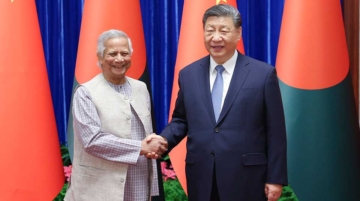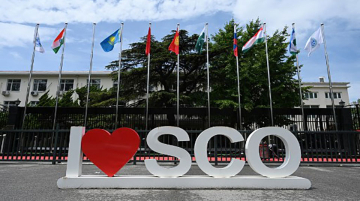
By Saniya Kulkarni
In what has turned out to be the closest election in the history of Sri Lankan politics, left-leaning Anura Kumara Dissanayake has unseated Ranil Wickremesinghe to become the island country’s eighth president, also defeating Namal Rajapaksa of the Rajapaksa clan that was ousted in 2022 following mass protests. Dissanayake is now faced with the mammoth task of pulling the Sri Lankan economy out of one of the worst crises it has plunged into while navigating austerity measures and balancing its interests between rival regional powers India and China.
Indian media houses have already expressed weariness about Dissanayake’s party platform, which has been seen as ideologically more closely aligned with China. One of Dissanayake’s campaign promises was to cancel a controversial investment project by the Indian Adani Group on the grounds that it threatened Sri Lanka’s “energy sovereignty.”
However, the general sense among Sri Lankan analysts is that the new President will display pragmatism in walking the tightrope between the two rivals and that he may be more amenable to working closely with India, especially after New Delhi’s pivotal role in providing financial assistance to Sri Lanka during the 2022 crisis. India’s long-term financing is set out to be worth $4 billion, even higher than the IMF’s bailout program of USD 3 billion.
Keeping Sri Lanka happy also ranks high in India’s priorities, given the crises in its neighborhood. India’s traditional ally, Sheikh Hasina, was forced to resign as Prime Minister of Bangladesh and flee the country in August 2024. First on the list for New Delhi then was to ensure that its close friendship with Bangladesh transcended internal leadership changes, considering it has been a supporter of Hasina’s party, Awami League over the course of her 15-year tenure.
This was one of many challenges for India’s ‘neighborhood first’ policy recently, following Maldivian President Mohamed Muizzu’s vocal criticism of the presence of Indian troops in the Maldives – albeit for non-military purposes.
Since this diplomatic spat earlier this year, several steps have been taken to reconcile and maintain the close relationship. New Delhi agreed to Male’s demands, and Muizzu has since gone back on his ‘India Out’ stance, emphasizing the “strong bilateral relationship” shared between the two.
At the same time, defense ties between the Maldives and China have been getting stronger, and while the details of the agreement signed in March 2024 have not been disclosed, it includes official permission for Chinese research vessel Xiang Yang Hong 03 to dock at Male Port. The vessel is a part of survey ships that collect oceanographic information, and while it was agreed that no data would be collected by the ship while docked at Male, India was weary, considering the proximity of the Maldives to its western coast.
Another point of contention between China and India is around the Gulf of Oman, where Gwadar port in Pakistan is being developed by the former and Chabahar in Iran by the latter. As one of the flagship projects of the Belt and Road Initiative (BRI), Gwadar’s significance to China comes from the access it provides to the IOR. To India, Chabahar’s significance is twofold – a counter to Chinese presence in Gwadar and as argued in a previous column, an assertion of its strategic autonomy.
On October 2, three Indian naval warships arrived in Bandar Abbas in Iran as part of a training mission in the Persian Gulf. With Iran now embroiled in a rapidly escalating war, it remains to be seen how India responds and how much it is willing to push the boundaries of its autonomy within and beyond its neighborhood.
Saniya Kulkarni is a Programme Manager at LSEIDEAS.






